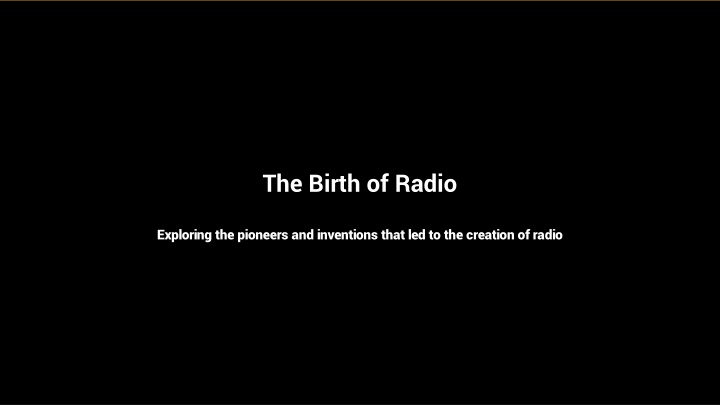
Exploring the Birth and Pioneers of Radio Technology
Uncover the fascinating history of radio technology from its origins with pioneers like Marconi, Hertz, Tesla, and Popov. Learn about the groundbreaking inventions and key figures that shaped the development of wireless communication. Dive into the early experiments, discoveries, and advancements that paved the way for modern radio transmission methods.
Download Presentation

Please find below an Image/Link to download the presentation.
The content on the website is provided AS IS for your information and personal use only. It may not be sold, licensed, or shared on other websites without obtaining consent from the author. If you encounter any issues during the download, it is possible that the publisher has removed the file from their server.
You are allowed to download the files provided on this website for personal or commercial use, subject to the condition that they are used lawfully. All files are the property of their respective owners.
The content on the website is provided AS IS for your information and personal use only. It may not be sold, licensed, or shared on other websites without obtaining consent from the author.
E N D
Presentation Transcript
The Birth of Radio Exploring the pioneers and inventions that led to the creation of radio
Introduction Radio as a term was first introduced by English physicist and chemist William Crookes in 1873. Crookes used the term to explain the results of results of certain chemical experiments, nearly 20 20 years before the invention of radio itself. Although Crookes was not involved in experiments on radio wave technology, he was a was a science fiction writer and published articles in articles in various journals. This presentation will explore the origins of radio radio and the key figures who contributed to its its development. Photo by Pexels Photo by Pexels
Early Inventors When discussing the origin of radio, the question question of who invented it first arises. Different countries have their own claimants of claimants of radio invention: Marconi in Italy, Hertz Hertz in Germany, Lodge in the UK, Branly in France, France, Tesla in the USA, and Popov in Russia. We will delve into these inventors' stories, but first, let's start with a brief overview of the history. Please note that the video description includes links to additional materials for more in-depth information. Photo by Pexels Photo by Pexels
Henry Hertz and Electromagnetic Waves Between 1885 and 1889, Henry Hertz conducted conducted experiments on the propagation of of electric force. His experiments demonstrated the reality of of electromagnetic waves, and he constructed an an oscillator, known as 'Hertzian oscillator', for these these experiments. Hertz's research was published in 1888, establishing experimental proof of Maxwell's theory that radio waves travel at the speed of light. One of Hertz's key conclusions was the possibility of wireless transmission of energy using electromagnetic fields. Photo by Pexels Photo by Pexels
Nikola Tesla and Radio Inventions Nikola Tesla, an inventor and engineer, described principles of radio communication in his public lectures in the United States in 1891. Tesla patented a reliable method of generating currents for radio communication, and in 1893, he began focusing on wireless communication. He developed a radio transmitter and a new type of antenna, successfully transmitting radio signals over a distance of 30 miles (50 kilometers) in 1895. Tesla's contributions to radio transmission laid the foundation for the future development of wireless communication technology. Photo by Pexels Photo by Pexels
Alexander Popov and Early Radio Transmission In Russia, Alexander Popov was actively studying the works of Hertz and became interested in the wireless transmission of signals without wires. In 1890, Popov presented his lecture on the possibility of using electromagnetic waves for wireless transmission. On May 7, 1895, Popov demonstrated a device that could detect electromagnetic waves produced by lightning strikes, which he called 'Popov's Thunderstorm Detector'. This device became the first radio receiver and marked the birth of radio, as the sound of working machinery was heard by everyone present in the room. Photo by Pexels Photo by Pexels
Controversies and Acknowledgement Guglielmo Marconi, an Italian inventor, applied for a patent in England for a similar invention to Popov's in June 1895. However, Marconi's publicity and recognition for radio inventions only began in late 1896, with advertisements appearing in the press. Vladimir Merkulov conducted an investigation into Marconi's claims in England, uncovering the truth of Popov's prior work. Despite these controversies, Marconi is considered the inventor of radio in Italy, but recognition of Popov's contributions has grown over time. Photo by Pexels Photo by Pexels
Conclusion In conclusion, the birth of radio can be attributed to a combination of contributions from various inventors. William Crookes introduced the term 'radio', Hertz and Tesla conducted groundbreaking experiments on electromagnetic waves, and Popov built the first radio receiver. While controversies and national pride influenced the recognition of inventors, the collective efforts of these pioneers paved the way for wireless communication technology. Radio, once deemed impractical, became a reality thanks to these revolutionary discoveries and inventions. Photo by Pexels Photo by Pexels
